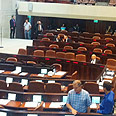
Who will be left out of next Knesset?
צילום: מורן אזולאי
Government to approve raising electoral threshold to 4%
If reform becomes law, small factions would be forced to merge or join larger parties. MK Tibi: Proposal targets Arab parties
Likud-Beiteinu, Yesh Atid and Habayit Hayehudi, the major prospective coalition partners in Israel's next government, have yet to agree on the distribution of ministerial portfolios, but they have reached an agreement according to which the threshold for Knesset representation would be raised from 2% to 4% as of the next election, Yedioth Ahronoth reported Wednesday.
Related stories:
The next government is expected to present the reform for the Knesset's approval. If the reform does indeed become law in the next parliament, only factions that win at least five mandates in the elections will be able to make it into the 20th Knesset.
The demand to raise the electoral threshold was made by Yesh Atid leader Yair Lapid and Yisrael Beiteinu Chairman Avigdor Lieberman. If the reform passes, it would deal a major blow to the Arab parties. In the January 22 elections, Balad won three Knesset seats, United Arab List-Ta'al has four representatives in the current Knesset, and Hadash, a joint Arab-Jewish party, also won four mandates.
The three parties would not have passed the proposed electoral threshold, meaning that ahead of the next election they will have to either unite or merge with other political factions.
"This proposal is aimed mainly against the Arab parties," said MK Ahmad Tibi of United Arab List-Ta'al. "This is revenge against the small parties, and we will fight the decision."
Should the reform become law, Jewish parties will also have to reassess their strategies: Meretz won only three Knesset seats in the last election, and Shaul Mofaz's Kadima party won just two mandates.
The reform would pose a challenge to additional small parties such as Ale Yarok, which are usually close to passing the electoral threshold. The proposal would force them to merge with larger parties.
The reform is meant to produce a more stable government by reducing the number of factions and creating united political blocs, such as a leftist bloc, an Arab bloc or a haredi bloc.
Tzvika Brot is a Ynet and Yedioth Ahronoth correspondent
- Receive Ynetnews updates directly to your desktop










